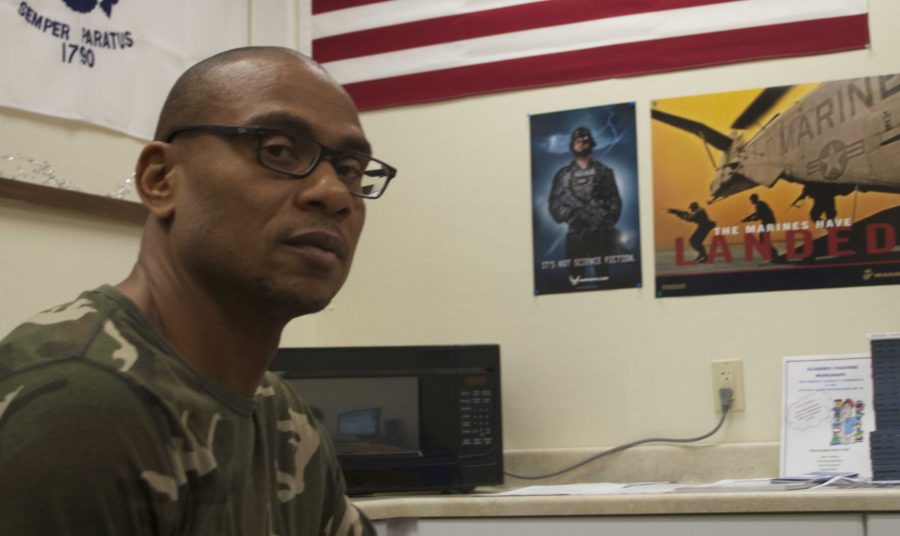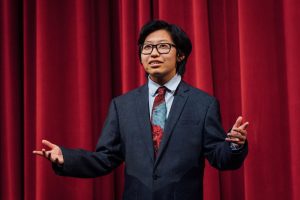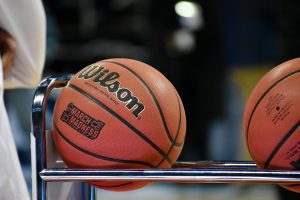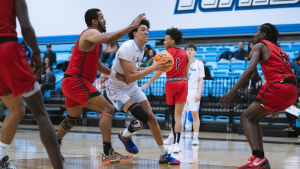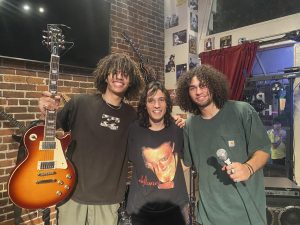Group counseling sessions to be offered at the Veterans Resource Center
Rhondon Jackson, a former Navy veteran currently studying nuclear medicine, poses in the Veterans Resource Center. Photo credit: Frank Ralph
October 23, 2015
In September, a student veteran entered the Veterans Resource Center (VRC) seeking help. He was struggling with alcohol, suicidal ideation and depression. Maria Martin, an official who works with student veterans, offered to take him to the health center. The veteran refused, feeling uncomfortable with the prospect of talking to a civilian counselor, and left.
The VRC will soon be able to help veterans like him through group counseling sessions that will most likely be implemented toward the end of November.
The sessions, to be facilitated by Danilo Amaya, a Marine Corps veteran majoring in social work at USC, and Dr. Caperton, Ph.D., will be a space for veterans to come together to discuss common issues such as adjusting to a civilian environment, post-traumatic stress disorder and other issues veterans may have.
“We’re trying to set up groups so veterans can adapt better from boots to books,” said Amaya, who has previously worked with gang youth and domestic violence-impacted individuals.
Staff Sgt. Robert Felix, an Air Force veteran who works in the VRC, said veterans approached Martin and asked her for group counseling.
“If they’re having issues with PTSD and TBI [traumatic brain injury], how can we expect them to graduate if they are battling their own personal demons,” Felix said.
Felix approached Sharon Manakas, coordinator of the Student Health Center, and Dean Amanuel Gebru to convey the request for group counseling. Manakas worked to find a way to provide veterans with tools and strategies to succeed at Moorpark from a health and wellness perspective.
Amaya is currently completing his master’s in social work, and needs to work in the field to complete his degree. He was selected to partner with Moorpark’s VRC until next May, during which he hopes to help student veterans receive the resources they need, both for personal and educational growth.
“I would like to see the veterans be able to communicate better with everyone outside the veterans center and show their resilience and make the school better,” Amaya said.
In addition to counseling, Manakas and Amaya are working to provide veterans with other resources like mindfulness training and information about places they can receive discounts and have fun at.
Eric Trembly, an Army veteran who is studying aviation and visits the VRC regularly, feels that veterans are more inclined to talk to other veterans, whom they identify with more than non-veterans. He feels the group sessions will provide the opportunity to discuss shared issues, and personally knows veterans he believes will attend these groups.
“A lot of us [veterans] are going through things that might have stemmed from experiences oversees, [from] the high stressed environment we’re in,” Trembly said. “There is definitely a need for it.”
Both Manakas and Amaya believe that ideas need to come from the ground up. Amaya plans to start each session discussing different topics with the veterans before deciding on one and focusing on it through the remainder of the session.
Groups can go up to 20 people, Amaya said. In addition, the VRC also offers one-on-one counseling.
The VRC is currently open from 10 a.m. to 3:00 p.m. Monday through Thursday.

